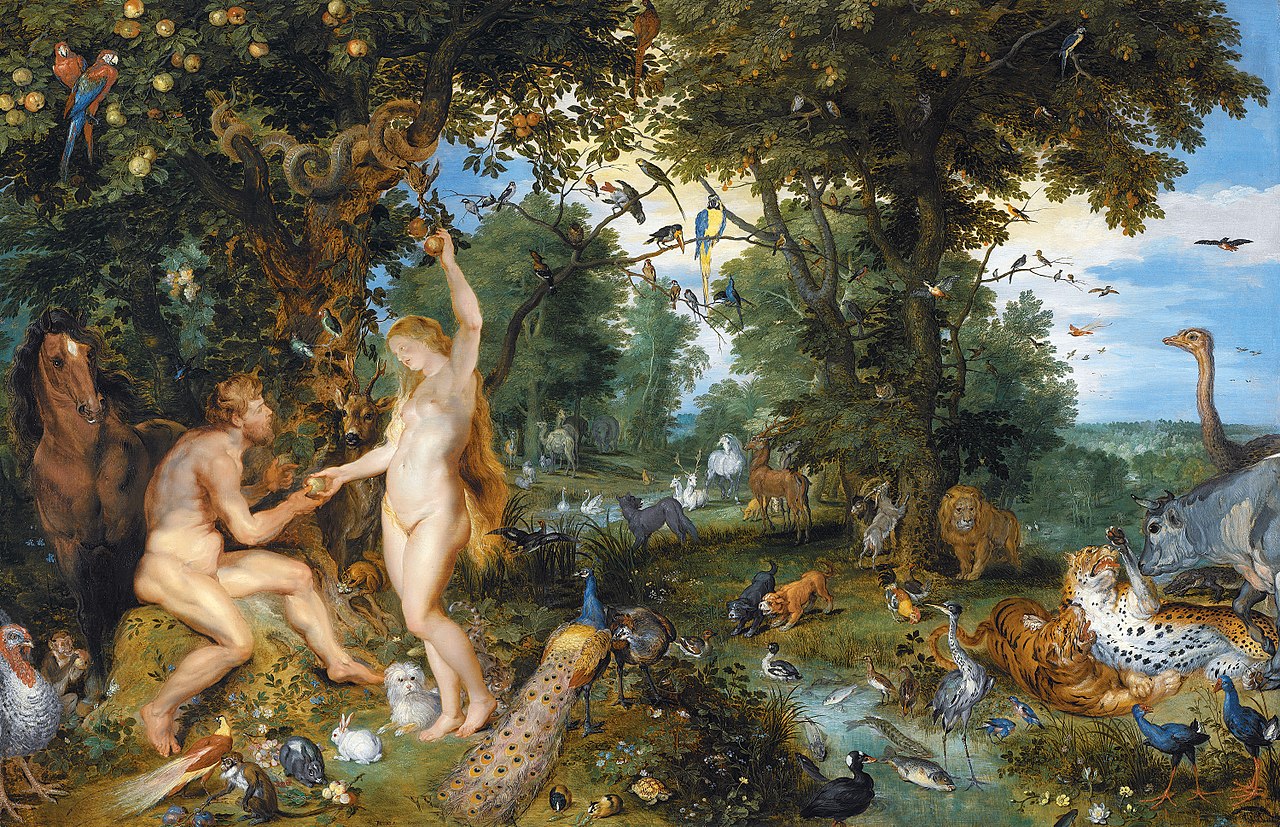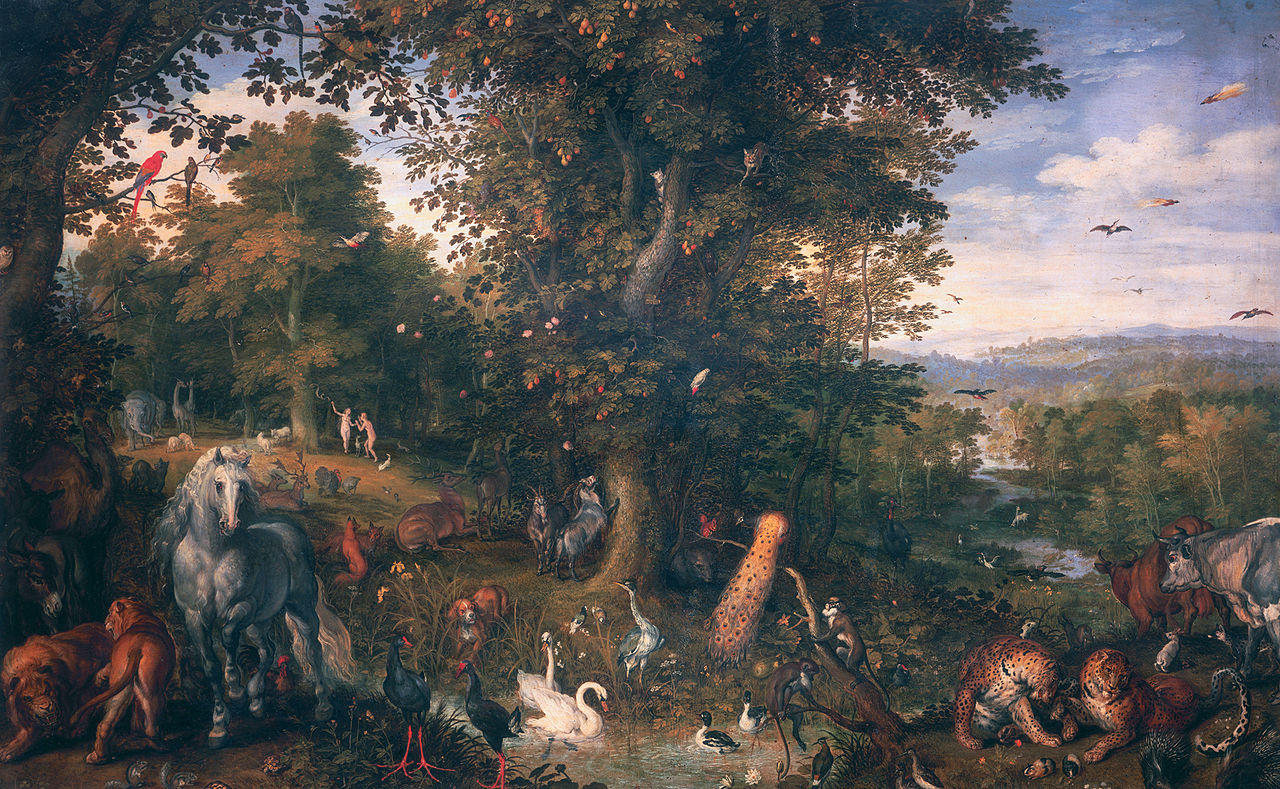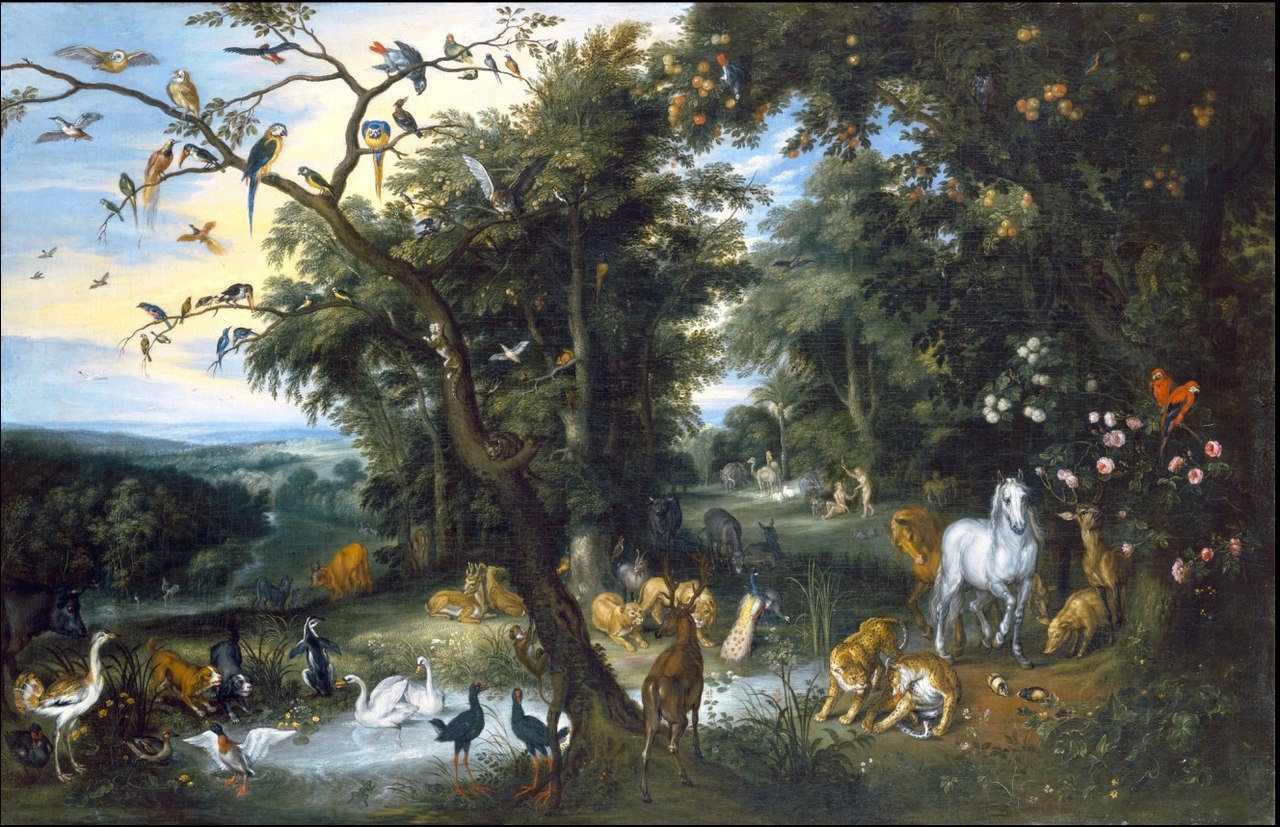Origins
To question how humanity could ever reach the bleak circumstances depicted in the Black Mirror episode, let us visit the place where work supposedly originated—the location of mankind’s creation.
According to Abrahamic creation stories, this place is a beautiful garden brimming with colors, sweet scents and lush vegetation. Soft green grass, a glorious warm sun. The purest, freshest air. The branches of the trees are heavy with delicious ripe fruits, and animals of all sorts peacefully grooming, sleeping or tenderly grazing the land as far as the eye can see.

FIG. 4: Jan Brueghel the Elder, and Peter Paul Rubens. 1615. The Garden of Eden with the Fall of Man. Mauritshuis. https://www.mauritshuis.nl/en/Explore/the-Collection/Artworks/the-Garden-of-Eden-with-the-Fall-of-Man-253/.

FIG. 4: Jan Brueghel the Elder, and Peter Paul Rubens. 1615. The Garden of Eden with the Fall of Man. Mauritshuis. https://www.mauritshuis.nl/en/Explore/the-Collection/Artworks/the-Garden-of-Eden-with-the-Fall-of-Man-253/.

FIG. 4: Jan Brueghel the Elder, and Peter Paul Rubens. 1615. The Garden of Eden with the Fall of Man. Mauritshuis. https://www.mauritshuis.nl/en/Explore/the-Collection/Artworks/the-Garden-of-Eden-with-the-Fall-of-Man-253/.
This is a sacred space, bursting with life, the perfect garden planted by a God . No cages, synthetic fertilizers, pesticides, herbicides or GMO products, just pure, untainted, thriving life. God created our ancestors to inhabit this space and gave them a primitive job description, which is today referred to as the ‘Cultural Mandate,’ also sometimes called the ‘Creation Mandate’:
Nancy Pearcey, in her book Total Truth,6 explains why it’s been called the ‘cultural’ mandate: she explains that the first phrase, ‘be fruitful and multiply,’ means to develop the social world: raise families, build cities, and develop governments and laws. The second phrase, ‘subdue the earth,’ means to harness the natural world: plant crops, build bridges, and eventually make computers. The verse essentially tells us that our original purpose was to create cultures and build civilizations.
The Eden story underscores the fact that human existence is an ‘exile’ from a primordial state of divine perfection. We are fated to live outside of heavenly Eden’s walls and within the safety of our own. However, in his book ‘A Heart for God',7 Sinclair Ferguson writes:
Work has been theorized time and time again to be a natural aspect of human existence and yet today we sit in our workplaces left with a sense of longing for the outdoors, for the quiet perfection of the beautiful garden that we lost somewhere along the way. Perhaps something went regarding the workplaces we have built; or perhaps it is the very nature of the work that leaves us dissatisfied…
3 Voltaire. 2020. “Candide Quote.” Libertyfund.Org. 2020. https://oll.libertyfund.org/quotes/207.
4 Gen. 1:28 Revised Standard Version
5 Pearcey, Nancy. 2008. Total Truth: Liberating Christianity from Its Cultural Captivity. Wheaton, Ill.: Crossway Books.
6 Ferguson, Sinclair B. 1987. A Heart for God : If He Can Be Known, How Can We Discover Him? Colorado Springs, Colo.: Navpress.
The Nature of Work
Prior to the 1800s, human work was understood for most as part of a lager order, people did not seem to see much separation between personal, professional and spiritual life. Most people worked for themselves as farmers or merchants. With the industrial revolution and the age of enlightenment, things changed, and a new paradigm, scientific materialism, emerged. This was a revolution focused on tools, processes and machines.
Humanity consequently learned to relate to the world as a collection of objects. Everything—animals, humans and nature as a whole—were seen as resources. This is reminiscent of the role imposed on us by God. However, this paradigm’s main principles was that all phenomena in the universe could be reduced to atoms, and their interactions and our ability to study them made us superior. Anything that did not fit such criteria was dismissed as nonscientific, outmoded or primitive.
It has been theorized that this paradigm gave birth to business organizations that were cold, impersonal and only interested in their employees as means for production of goods. Although much was gained, much was also lost. Humans developed a sense of disconnection from themselves, from others and from nature— and in the process grew feelings of alienation, loss and loneliness.